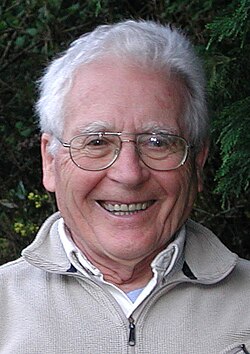James Lovelock Quote
If you start any large theory, such as quantum mechanics, plate tectonics, evolution, it takes about 40 years for mainstream science to come around. Gaia has been going for only 30 years or so.
James Lovelock
If you start any large theory, such as quantum mechanics, plate tectonics, evolution, it takes about 40 years for mainstream science to come around. Gaia has been going for only 30 years or so.
Tags:
science
Related Quotes
Certainly we can say that the pace of modern life, increased and supported by our technology in general and our personal electronics in particular, has resulted in a short attention span and an addict...
Arthur Rosenfeld
Tags:
being, complicated, critical thinking, daoism, emotion, feeling, hectic, life, meditation, modern life
About James Lovelock
James Ephraim Lovelock (26 July 1919 – 26 July 2022) was an English independent scientist, environmentalist and futurist. He is best known for proposing the Gaia hypothesis, which postulates that the Earth functions as a self-regulating system.
With a PhD in the chemistry of disinfection, Lovelock began his career performing cryopreservation experiments on rodents, including successfully thawing and reviving frozen specimens. His methods were influential in the theories of cryonics (the cryopreservation of humans). He invented the electron capture detector and, using it, became the first to detect the widespread presence of chlorofluorocarbons in the atmosphere. While designing scientific instruments for NASA, he developed the Gaia hypothesis.
In the 2000s, he proposed a method of climate engineering to restore carbon dioxide–consuming algae. He was an outspoken member of Environmentalists for Nuclear Energy, asserting that fossil fuel interests have been behind opposition to nuclear energy, citing the effects of carbon dioxide as being harmful to the environment and warning of global warming due to the greenhouse effect. He wrote several environmental science books based upon the Gaia hypothesis from the late 1970s.
He also worked for MI5, the British security service, for decades. Bryan Appleyard, writing in The Sunday Times, described him as "basically Q in the James Bond films".
With a PhD in the chemistry of disinfection, Lovelock began his career performing cryopreservation experiments on rodents, including successfully thawing and reviving frozen specimens. His methods were influential in the theories of cryonics (the cryopreservation of humans). He invented the electron capture detector and, using it, became the first to detect the widespread presence of chlorofluorocarbons in the atmosphere. While designing scientific instruments for NASA, he developed the Gaia hypothesis.
In the 2000s, he proposed a method of climate engineering to restore carbon dioxide–consuming algae. He was an outspoken member of Environmentalists for Nuclear Energy, asserting that fossil fuel interests have been behind opposition to nuclear energy, citing the effects of carbon dioxide as being harmful to the environment and warning of global warming due to the greenhouse effect. He wrote several environmental science books based upon the Gaia hypothesis from the late 1970s.
He also worked for MI5, the British security service, for decades. Bryan Appleyard, writing in The Sunday Times, described him as "basically Q in the James Bond films".
